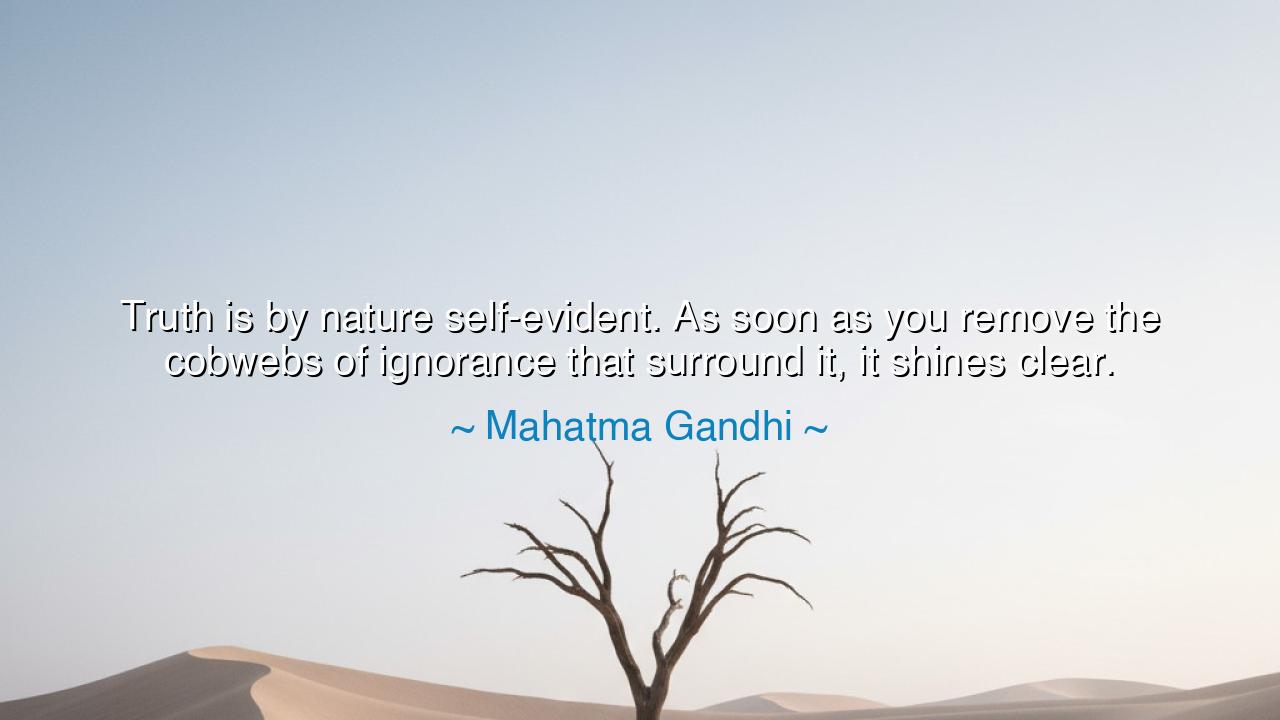
Truth is by nature self-evident. As soon as you remove the
Truth is by nature self-evident. As soon as you remove the cobwebs of ignorance that surround it, it shines clear.






When Mahatma Gandhi proclaimed, “Truth is by nature self-evident. As soon as you remove the cobwebs of ignorance that surround it, it shines clear,” he was not speaking as a philosopher lost in abstractions, but as a seeker who had tested these words in the furnace of life. To him, truth was not something manufactured or invented by human hands, but something eternal, woven into the very fabric of existence. It is there, always, like the sun hidden by clouds. What obscures it are the cobwebs of ignorance—fear, prejudice, falsehood, selfishness. Remove these, and truth does not need to be proved; it reveals itself, radiant and undeniable.
The origin of this idea lay in Gandhi’s lifelong devotion to Satya, the Sanskrit word for truth. Influenced by the Bhagavad Gita, Jain philosophy, and the teachings of Tolstoy and Christ, Gandhi built his life on the conviction that truth is divine and eternal. But he also saw how often men fail to perceive it, blinded by passion, hatred, and illusion. Thus his mission was not to create truth, but to clear away the ignorance that concealed it—whether in politics, in personal conduct, or in the soul. His struggle against colonial rule in India was not merely a political battle, but a quest to make the truth of justice shine clear for all to see.
History offers a powerful illustration of Gandhi’s words in the abolition of slavery. For centuries, entire nations justified slavery with elaborate arguments, twisting philosophy, law, and even scripture to defend what was cruel and unjust. But once the cobwebs of ignorance—racial prejudice, greed, and fear—were stripped away, the truth stood radiant: no man can own another. That truth was not invented by abolitionists; it was self-evident all along, waiting to shine through once ignorance was removed.
The ancients also bore witness to this reality. Socrates declared that knowledge is remembering—that the truth already resides in the soul, waiting to be uncovered. He believed that ignorance, not malice, was the true enemy of virtue. Gandhi’s words echo this wisdom: truth does not need elaborate construction, only the removal of illusions. In this sense, to seek truth is to practice purification of vision, to clear the inner eye until it beholds what has always been there.
The meaning of Gandhi’s teaching is both humbling and hopeful. Humbling, because it reminds us that when we cling to falsehoods, we are not denying truth itself, but only blinding ourselves to it. Hopeful, because it assures us that truth will always endure, waiting patiently for the fog to lift. Just as the sun rises regardless of whether the traveler keeps his eyes open, so truth persists even when it is hidden behind lies. Our task is not to create it, but to align ourselves with it.
The lesson for us is this: seek not to force truth, but to remove ignorance. Examine the prejudices, fears, and selfish desires that cloud your judgment. Be willing to admit when your own cobwebs obscure your sight. And when confronted with lies—whether in society or in your own heart—do not despair. Work steadily, patiently, to clear them away, and trust that truth will reveal itself when the fog is gone.
Practically, live this teaching by cultivating awareness. Read widely, listen deeply, and question your assumptions. In conflict, ask: “What is obscuring the truth here—fear, pride, anger?” Practice humility, for arrogance breeds ignorance. And above all, live with integrity: act in accordance with the truths you already know, however small, and you will find your vision becoming clearer.
Thus Gandhi’s words endure as a torch for all ages: truth is eternal, radiant, and self-evident—our task is only to clear the cobwebs of ignorance. If we devote our lives to this patient work, then we too will see truth shine, not as a distant dream, but as the very light by which we live.






AAdministratorAdministrator
Welcome, honored guests. Please leave a comment, we will respond soon